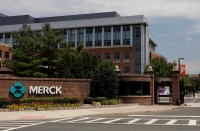Merck, Bristol-Myers profits rise on cancer drug sales

By Michael Erman and Manas Mishra
(Reuters) - Merck & Co Inc (NYSE: MRK) and Bristol-Myers Squibb Co (NYSE: BMY) posted better-than-expected third quarter profit and raised their 2018 earnings forecasts on Thursday due to strong demand for their rival cancer immuno-oncology treatments.
But shares of both U.S. drugmakers fell as investors worry about a plan the Trump administration is expected to unveil on Thursday aimed at lowering prices the government's Medicare healthcare program pays for specialty drugs like cancer treatments.
Bristol-Myers pioneered cancer immunotherapy with Yervoy and later its blockbuster drug Opdivo. But Merck & Co's (NYSE: MRK) rival treatment Keytruda has seized a dominant position in lung cancer - the most lucrative oncology market - and Bristol-Myers' shares have suffered.
Keytruda sales exceeded those for Opdivo for the second straight quarter. It has been amassing approvals as a standalone therapy and in combination with other drugs to treat several forms of cancers, and has become the leader in both new patient starts and total patient volume.
Keytruda sales rose more than 80 percent to $1.89 billion for the quarter, slightly beating analyst estimates. Bristol's Opdivo had sales of $1.79 billion, beating analyst estimates by around $100 million.
Yervoy also performed better than expected with sales of $382 million in the quarter.
Bristol-Myers shares were down 2.4 percent at $47.68 in early trading, while Merck shares fell 2.5 percent to $68.80. Bristol-Myers' shares had been down 20 percent so far this year, while Merck's shares were up 25 percent, as each new clinical success for Keytruda weighed on Bristol shares.
SunTrust Robinson Humphrey analyst John Boris said the expected announcement from U.S. President Donald Trump "is a direct shot against the immuno-oncology players."
MERCK TO BUYBACK SHARES, RAISE DIVIDEND
Merck reported adjusted earnings of $1.19 per share, beating analysts' average estimate by 5 cents, according to Refinitiv data. Revenue rose 4.5 percent to $10.79 billion, falling short of Wall Street expectations of $10.88 billion.
The company also announced a $10 billion share buyback and raised its quarterly dividend by 15 percent.
"Expectations were high coming into the quarter, but we think these results should still be well received and allow for continued confidence," Credit Suisse analyst Vamil Divan said in a note.
Merck said it plans to spend $16 billion on capital projects through 2022, up from its previous projection of $12 billion, to increase manufacturing capacity in oncology, vaccines and animal health.
"We are confident in our future growth prospects," said Merck Chief Executive Kenneth Frazier, who will remain in the role beyond 2019 after the company scrapped its mandatory retirement age.
Merck also saw strong growth from Gardasil, its vaccine to prevent HPV-related cancers. Gardasil sales grew 55 percent to $1.05 billion, helped by increased demand in China and Australia, and its growth should be helped by recently expanded U.S. approval to treat people up to age 45.
Bristol-Myers' said it earned $1.09 a share, excluding special items, topping analysts' average expectations by 18 cents.
Revenue rose 8 percent to $5.69 billion, just shy of Wall Street estimates of $5.72 billion.
Sales of blood clot preventer Eliquis, which Bristol shares with Pfizer Inc (NYSE: PFE), rose 28 percent from last year to $1.58 billion, but fell short of analyst expectations of $1.67 billion.
Bristol-Myers' effective tax rate was 11.8 percent in the quarter. It now expects a full-year adjusted tax rate of 17 percent, at the bottom end of its previous forecast.
(Reporting by Michael Erman in New York and Saumya Sibi Joseph and Manas Mishra in Bengaluru; Editing by Bill Berkrot)
